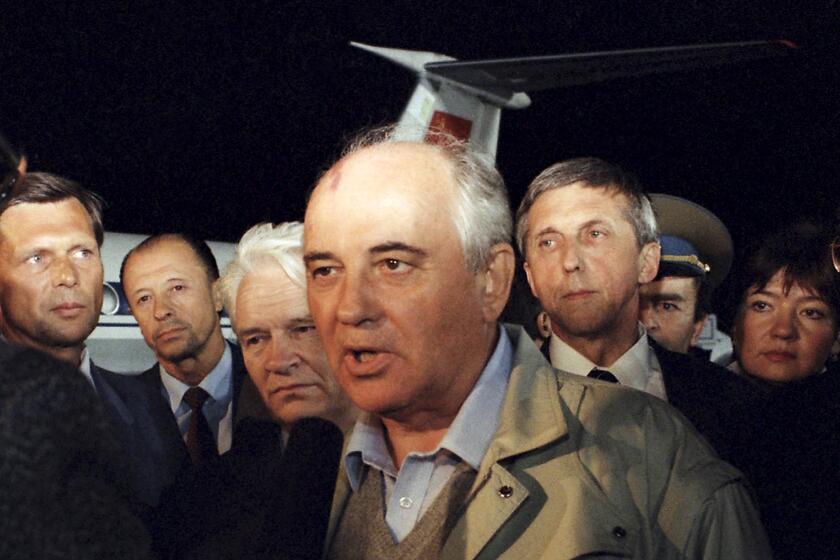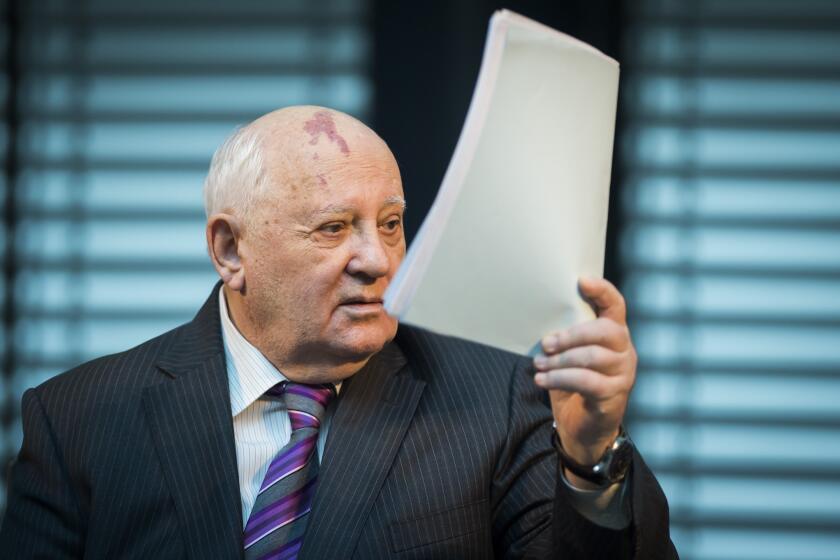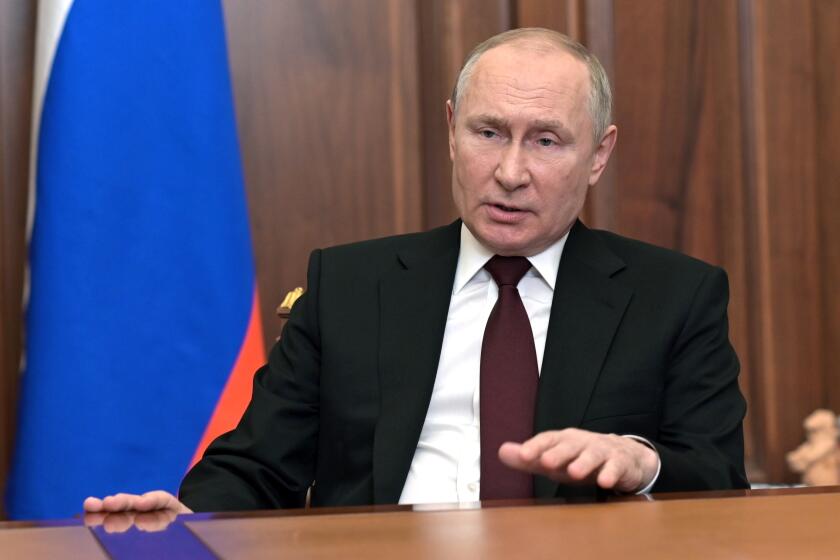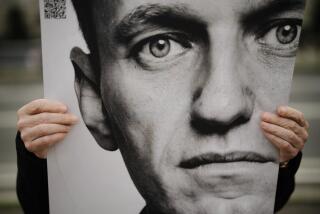Gorbachev mourned as a rare world leader, but some remain bitter over his legacy
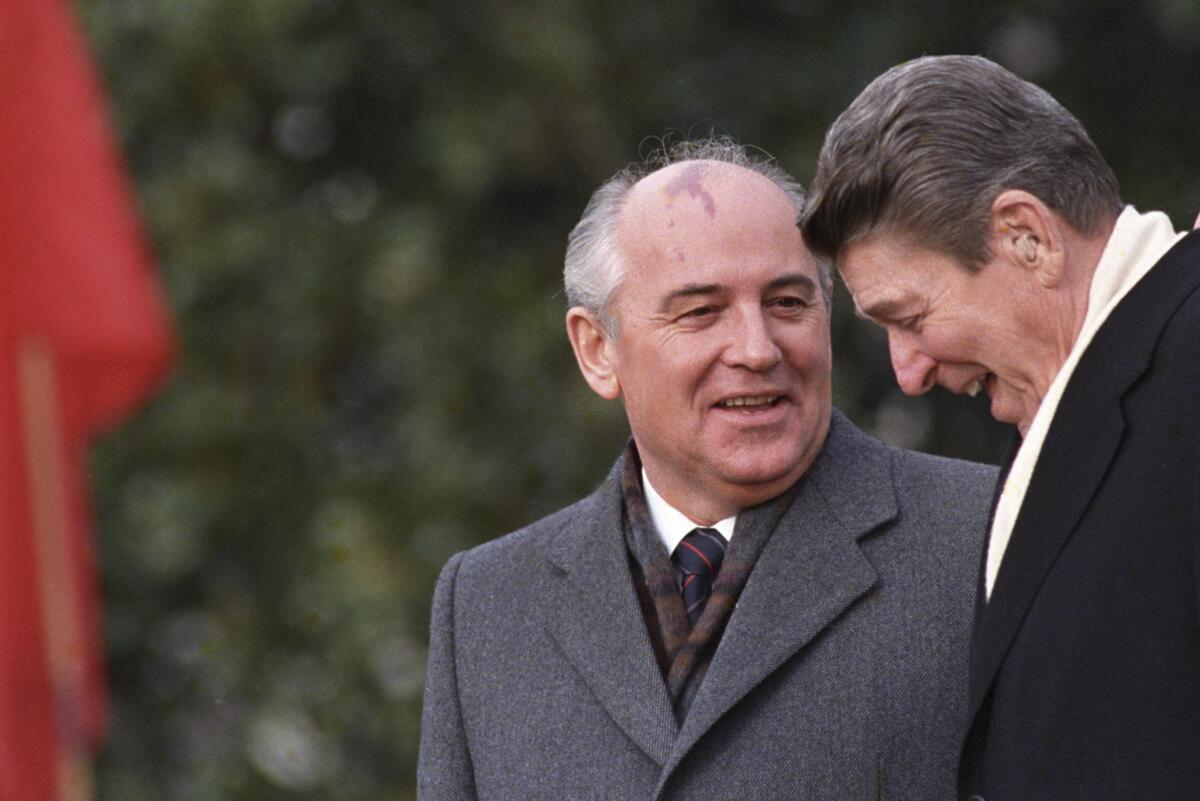
- Share via
BERLIN — The passing of Mikhail S. Gorbachev, the last leader of the Soviet Union and for many the man who restored democracy to Communist-ruled European nations, was mourned Wednesday as a rare leader who changed the world and, for a time, gave hope for peace among the superpowers.
But the man who died at age 91 on Tuesday was also reviled by many compatriots who blamed him for the 1991 implosion of the Soviet Union and its diminution as a superpower. The Russian nation that emerged from its Soviet past shrank in size as 15 new nations were created.
The loss of pride and power also eventually led to the rise of President Vladimir Putin, who has tried for the last quarter-century to restore Russian might through autocracy and military belligerence.
“After decades of brutal political repression, he embraced democratic reforms. He believed in glasnost and perestroika — openness and restructuring — not as mere slogans, but as the path forward for the people of the Soviet Union after so many years of isolation and deprivation,” President Biden said of Gorbachev.
He added that “these were the acts of a rare leader, one with the imagination to see that a different future was possible and the courage to risk his entire career to achieve it. The result was a safer world and greater freedom for millions of people.”
Gorbachev won the 1990 Nobel Peace Prize for his role in ending the Cold War but, though widely feted abroad, he was a pariah at home.
Mikhail S. Gorbachev, Soviet leader who knocked down the walls between East and West, dies at 91.
Putin acknowledged that Gorbachev had “a deep impact on the course of world history.”
“He led the country during difficult and dramatic changes, amid large-scale foreign policy, economic and social challenges,” Putin said in a short telegram sending his condolences to Gorbachev’s family.
Gorbachev “realized that reforms were necessary and tried to offer his solutions to the acute problems,” Putin said.
Reactions from Russian officials and lawmakers were mixed. They applauded Gorbachev for his part in ending the Cold War but censured him for the collapse of the Soviet Union.
Oleg Morozov of the main Kremlin party, United Russia, said Gorbachev should have “repented” for mistakes that went against Russia’s interests.
“He was a willing or an unwilling co-author of the unfair world order that our soldiers are now fighting on the battlefield,” Morozov said, in a reference to the war in Ukraine.
Lech Walesa, the leader of Poland’s pro-democracy Solidarity movement in the 1980s and the country’s president from 1990 to 1995, was muted in his praise of Gorbachev. He said he “admired, even liked him, but did not understand [him].”
“He believed to the last that communism could be reformed, but I, on the contrary, did not believe it was possible,” Walesa told the Wirtualna Polska media group.
Walesa added: “He knew that the Soviet Union could not last much longer, and he was doing everything he could to prevent the world from bringing Russia to account for communism. And he was successful there.”
World leaders paid tribute to a man some described as a great and brave leader.
In Germany, where Gorbachev is considered one of the fathers of the country’s reunification in 1990 and is popularly referred to as “Gorbi,” former Chancellor Angela Merkel saluted him as “a unique world politician.”
It’s been nearly 10 years since Mikhail S.
“Gorbachev wrote world history. He exemplified how a single statesman can change the world for the better,” she said in a statement, recalling how she had feared Russian tanks might roll into East Germany, where she lived, as the Berlin Wall fell in 1989.
German Chancellor Olaf Scholz praised Gorbachev for paving the way for his country’s reunification but noted that many of the Soviet leader’s achievements have been destroyed.
“We know that he died at a time when not only democracy in Russia has failed — there is no other way to describe the current situation there — but also Russia and Russian President Putin are drawing new trenches in Europe and have started a horrible war against a neighboring country, Ukraine,” Scholz aid.
Outgoing British Prime Minister Boris Johnson also referred to the current conflict, saying that “in a time of Putin’s aggression in Ukraine, [Gorbachev’s] tireless commitment to opening up Soviet society remains an example to us all.”
Start your day right
Sign up for Essential California for the L.A. Times biggest news, features and recommendations in your inbox six days a week.
You may occasionally receive promotional content from the Los Angeles Times.
French President Emmanuel Macron described Gorbachev as “a man of peace whose choices opened up a path of liberty for Russians. His commitment to peace in Europe changed our shared history.”
Others in Europe challenged positive recollections of Gorbachev.
Gabrielius Landsbergis, whose grandfather, Vytautas Landsbergis, led Lithuania’s independence movement in the early 1990s, tweeted that “Lithuanians will not glorify Gorbachev.”
Memories are still fresh in the Baltic country of Jan. 13, 1991, when hundreds of Lithuanians headed to the television tower in Vilnius to oppose Soviet troops deployed to crush the country’s bid to restore its independence. In the clashes that followed, 14 civilians were killed and more than 140 others were injured. Moscow recognized Lithuania’s independence in August that year.
Sometimes you don’t realize you needed a cinematic pairing until you see it, as with Werner Herzog interviewing Mikhail Gorbachev for the German filmmaker’s biographical doc of the consequential 20th century world leader, “Meeting Gorbachev.”
“We will never forget the simple fact that his army murdered civilians to prolong his regime’s occupation of our country. His soldiers fired on our unarmed protestors and crushed them under his tanks. That is how we will remember him,” wrote the younger Landsbergis, who is Lithuania’s foreign minister.
But another Baltic leader, Latvian President Egils Levits, noted that Gorbachev’s policies enabled the eventual independence of the three Baltic countries, which were Soviet republics.
United Nations Secretary-General António Guterres called Gorbachev “a one-of-a-kind statesman who changed the course of history” and “did more than any other individual to bring about the peaceful end of the Cold War.”
“The world has lost a towering global leader, committed multilateralist, and tireless advocate for peace,” he said in a statement.
Mikhail Gorbachev on Saturday had strong words for the United States and its allies over growing tension between Moscow and the West, a development he believes has put the world “on the brink of a new Cold War.”
Gorbachev’s contemporaries pointed to the end of the Cold War as one of his achievements.
“Mikhail Gorbachev played a critical role in the peaceful end to the Cold War. At home, he was a figure of historical importance, but not in the way he intended,” said Robert M. Gates, who led the CIA from 1991 to 1993 and later became U.S. Defense secretary.
Calling Gorbachev “a brave leader and great statesman,” Israeli Prime Minister Yair Lapid said the last Soviet leader “opened the gates of the Soviet Union for the great wave of Jewish immigration to Israel in the 1990s.”
In Asia, Gorbachev was remembered as a leader with the courage to bring change.
Russian President Vladimir Putin needs the former Soviet republic Ukraine for his dream of returning superpower days.
China’s government recognized Gorbachev’s role in healing relations between Moscow and Beijing. Gorbachev had been an inspiration to reformist thinkers in China during the late 1980s, and his visit to Beijing in 1989 marked a watershed in relations between the sides.
“Mr. Gorbachev made positive contributions to the normalization of relations between China and the Soviet Union. We mourn his passing and extend our sympathies to his family,” Foreign Ministry spokesperson Zhao Lijian said.
However, China’s Communist Party leaders also regard Gorbachev’s liberal approach as a fatal display of weakness and his moves toward peaceful coexistence with the West as a form of surrender.
More to Read
Sign up for Essential California
The most important California stories and recommendations in your inbox every morning.
You may occasionally receive promotional content from the Los Angeles Times.
